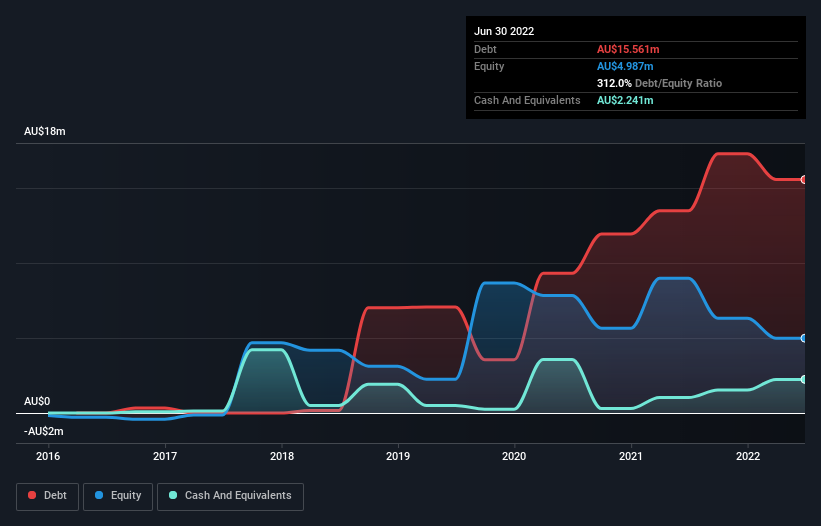David Iben put it well when he said, 'Volatility is not a risk we care about. What we care about is avoiding the permanent loss of capital.' When we think about how risky a company is, we always like to look at its use of debt, since debt overload can lead to ruin. We note that Babylon Pump & Power Limited (ASX:BPP) does have debt on its balance sheet. But should shareholders be worried about its use of debt?
When Is Debt A Problem?
Debt is a tool to help businesses grow, but if a business is incapable of paying off its lenders, then it exists at their mercy. In the worst case scenario, a company can go bankrupt if it cannot pay its creditors. However, a more common (but still painful) scenario is that it has to raise new equity capital at a low price, thus permanently diluting shareholders. Having said that, the most common situation is where a company manages its debt reasonably well - and to its own advantage. The first thing to do when considering how much debt a business uses is to look at its cash and debt together.
View our latest analysis for Babylon Pump & Power
What Is Babylon Pump & Power's Net Debt?
The image below, which you can click on for greater detail, shows that at June 2022 Babylon Pump & Power had debt of AU$15.6m, up from AU$13.5m in one year. On the flip side, it has AU$2.24m in cash leading to net debt of about AU$13.3m.

A Look At Babylon Pump & Power's Liabilities
According to the last reported balance sheet, Babylon Pump & Power had liabilities of AU$20.3m due within 12 months, and liabilities of AU$3.69m due beyond 12 months. On the other hand, it had cash of AU$2.24m and AU$4.44m worth of receivables due within a year. So its liabilities outweigh the sum of its cash and (near-term) receivables by AU$17.4m.
This deficit casts a shadow over the AU$9.83m company, like a colossus towering over mere mortals. So we definitely think shareholders need to watch this one closely. After all, Babylon Pump & Power would likely require a major re-capitalisation if it had to pay its creditors today. There's no doubt that we learn most about debt from the balance sheet. But you can't view debt in total isolation; since Babylon Pump & Power will need earnings to service that debt. So if you're keen to discover more about its earnings, it might be worth checking out this graph of its long term earnings trend.
Over 12 months, Babylon Pump & Power reported revenue of AU$28m, which is a gain of 28%, although it did not report any earnings before interest and tax. With any luck the company will be able to grow its way to profitability.
Caveat Emptor
While we can certainly appreciate Babylon Pump & Power's revenue growth, its earnings before interest and tax (EBIT) loss is not ideal. Indeed, it lost a very considerable AU$3.9m at the EBIT level. When we look at that alongside the significant liabilities, we're not particularly confident about the company. We'd want to see some strong near-term improvements before getting too interested in the stock. Not least because it burned through AU$1.0m in negative free cash flow over the last year. So suffice it to say we consider the stock to be risky. When analysing debt levels, the balance sheet is the obvious place to start. However, not all investment risk resides within the balance sheet - far from it. Case in point: We've spotted 5 warning signs for Babylon Pump & Power you should be aware of.
If you're interested in investing in businesses that can grow profits without the burden of debt, then check out this free list of growing businesses that have net cash on the balance sheet.
Valuation is complex, but we're here to simplify it.
Discover if Babylon Pump & Power might be undervalued or overvalued with our detailed analysis, featuring fair value estimates, potential risks, dividends, insider trades, and its financial condition.
Access Free AnalysisHave feedback on this article? Concerned about the content? Get in touch with us directly. Alternatively, email editorial-team (at) simplywallst.com.
This article by Simply Wall St is general in nature. We provide commentary based on historical data and analyst forecasts only using an unbiased methodology and our articles are not intended to be financial advice. It does not constitute a recommendation to buy or sell any stock, and does not take account of your objectives, or your financial situation. We aim to bring you long-term focused analysis driven by fundamental data. Note that our analysis may not factor in the latest price-sensitive company announcements or qualitative material. Simply Wall St has no position in any stocks mentioned.
About ASX:BPP
Babylon Pump & Power
Babylon Pump & Power Ltd provides specialty mining services to the resources sector in Australia.
Solid track record with mediocre balance sheet.
Market Insights
Community Narratives



